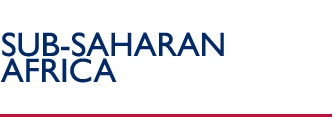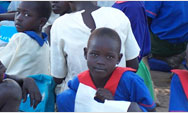Democracy & Governance
Weaknesses in democratic governance dampen economic activity, cause civil unrest, and can create fertile ground for terrorists. The work of USAID to strengthen the principles of democracy and good governance in Africa creates the conditions for peace and promotes U.S. and world security.
This effort consists of information sharing on state-of-the-art innovations; technical assistance to USAID's Africa field missions; grants to African non-governmental organizations (NGOs) for human rights and democracy-building activities; grants for critical democracy and governance activities, such as elections support and civic education; an initiative to combat corruption in Africa; and projects integrating the promotion and practice of good governance principles into other development sectors.
Democracy and good governance provide the foundation for sustainable development in Africa. Effective government, which represents the interests of the people and is accountable and transparent, is the best insurance that the needs and desires of citizens will be met. Long-term improvements in health, education, economic growth or the environment in African countries ultimately require responsive and representative governments that can implement the changes necessary to promote and consolidate such gains.
A number of obstacles to the consolidation of democratic political systems in Africa remain. These include entrenched political leaders, a lack of checks and balances, conflict, the political dimension of economic reform, corruption, and a lack of a democratic political culture. However, positive trends are emerging. In the recent years elections have led to the peaceful transfer of power in, Zambia, Mali, Senegal, Madagascar, Ghana, and Kenya. There is also a growing trend toward decentralization, which devolves authority away from central control to sub-national and local governments. And civil society organizations continue to grow in numbers and strength, although the need to create urban-rural linkages and broaden constituency bases exists.
USAID helps advance democracy in Africa by promoting the rule of law; free and fair elections; a politically active civil society; and transparent, accountable, and participatory governance through activities in 28 countries in Africa, as well as three regional programs. Program foci range from increasing access to and participation in the political system, to empowering local NGOs, to elections support, to strengthening democratic institutions such as the legislature. The types of programs vary from technical assistance and training to financial support. Funding levels range from small grants under such programs as the Democracy and Human Rights Fund to multi-year, multi-million dollar projects such as the Anti-Corruption Initiative, which ends in 2007, as many USAID Missions mainstream anti-corruptions initiatives into ongoing portfolios across sectors. USAID also supports the Afrobarometer, the first polling service to use surveys of attitudes and opinions to gauge Africans' sentiments about democracy and economic growth. Afrobarometer survey reports and working papers can be found here: www. afrobarometer.org.For information on country specific Democracy and Governance Programs, see Democracy and Governance in Africa.
Back to Top ^ |


